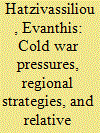|
|
|
Sort Order |
|
|
|
Items / Page
|
|
|
|
|
|
|
| Srl | Item |
| 1 |
ID:
092681


|
|
|
| 2 |
ID:
137056


|
|
|
|
|
| Summary/Abstract |
In a prolonged multidimensional conflict such as the Cold War, military threats were aggravated by the challenges of internal subversion and propaganda. These posed huge problems to the smaller NATO members, who lacked the resources to respond to Soviet bloc/communist tactics. This article focuses on two Greek proposals to NATO, in 1952 and 1958, which intended to address such issues. In the first instance, Athens contributed to the creation of the NATO Special Committee. In 1958, a Greek proposal on psychological warfare was brushed aside. The article tries to interpret Greek motives, the alliance's response and the reasons which led to the rejection of the latter proposal.
|
|
|
|
|
|
|
|
|
|
|
|
|
|
|
|
| 3 |
ID:
132010


|
|
|
|
|
| Publication |
2014.
|
| Summary/Abstract |
This article discusses U.S. penetration of Greece in 1947-1952, but also the shaping of a more balanced relationship later in the 1950s. Analysis includes both the official, political/strategic relationship, but also the cultural level and the activities of American nongovernmental educational institutions in Greece, an aspect largely ignored by available scholarship. It is argued that the United States was successful because, apart from ensuring the victory of the pro-Western forces in the Greek civil war, it stimulated economic development, transfer of ideas, political change and renovation, and eventually Greece's integration in the hard core of the postwar West. The U.S. experience of Greece, especially during an early phase (the late 1940s), played an important role in the shaping of containment policies, which were not simply anti-Soviet and anti-Communist, and also involved U.S. leadership of an institutionalized, value-oriented West.
|
|
|
|
|
|
|
|
|
|
|
|
|
|
|
|
|
|
|
|
|